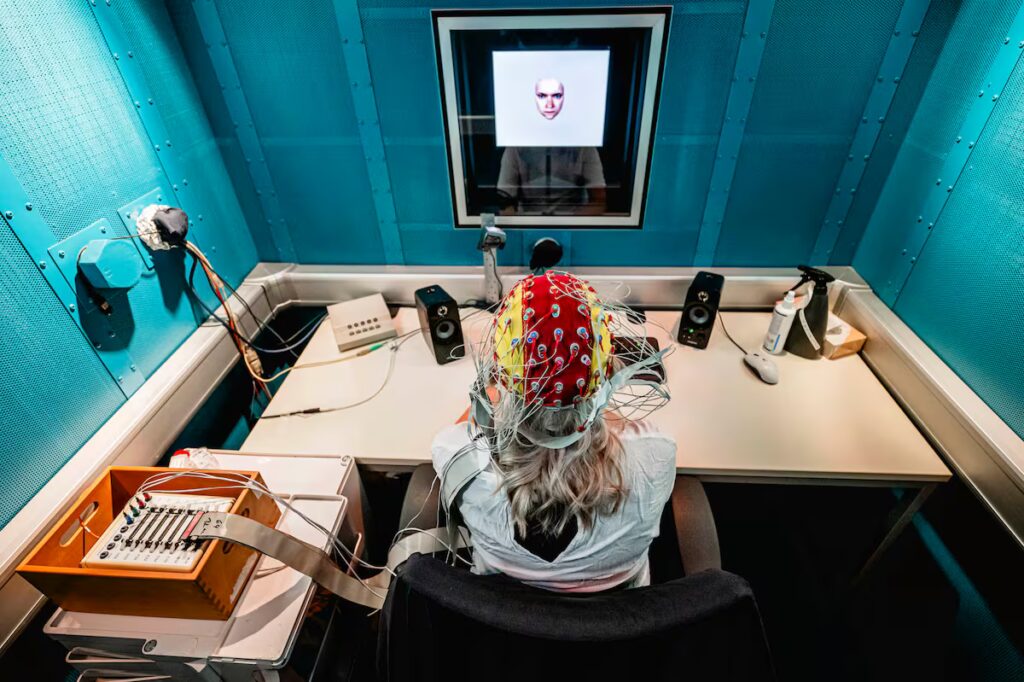
Emerging cases of companies selling transcranial stimulation devices and the possibility of transcranial stimulation devices entering the market neurofeedback With portable brain activity meters they open the doors to the possibility of mental enhancement, that is, the use of neurotechnology to increase the mental and cognitive abilities of our species. What are we talking about? We imagine the possibility of not only being able to mentally communicate or operate tools without opening our mouth or moving a finger, but also to increase our memory capacity, to be able to process visual information more quickly, to have immediate access to huge databases when we think about things, or even to plan our behavior or actions more intelligently and effectively.
Imagine reprogramming our brain activity, being able to increase or decrease some aspects of our personality, like a sort of cosmetic surgery, but this time psychological instead of physical. Although this may seem incredible, it really shouldn’t surprise you, since all these mental abilities of human beings take place through the brain, or to be precise the nervous system, and if we can change its activity, we can also change them.
As we have already mentioned above, humans have increased our capabilities since the beginning of our history: fire, the wheel, the printing press, the steam engine, cars, airplanes, computers, etc., are all inventions to be able to do things better. The same glasses I wear allow me to see with farsighted eyes. So why shouldn’t we be able to augment our vision with neurotechnology and smart glasses that allow us to analyze what we see? Not only have we enriched ourselves with technology throughout our history, but doing so is largely what defines us as a species. The German philosopher Martin Heidegger defines the human being as the animal that makes tools, but why do we want tools if not to be able to do things that we cannot do better? We carry it in our DNA and we won’t stop. In fact, it is now that we can truly improve ourselves, since we are mental animals.
Because of our history as a species and our highly competitive society and culture, my sincere opinion is that mental and cognitive enhancement with neurotechnology is inevitable. It is something I take for granted and we must face the great ethical and moral challenges it brings. A fundamental question is what human species do we want to be. Another important issue is who controls the rules of the game or decides who can or cannot be raised. These are thorny questions: for example, at the Morningside group meeting, with twenty-five expert neuroscientists (in law and ethics) from around the world, there were twenty-five different opinions on what to do with mental enhancement: some proposed banning it, others said it should be universal. Digesting this issue is something we are working on and I don’t have a firm opinion on yet, but one idea we are exploring is the possibility of mind-enhancing neurotechnology, even if based on portable tools, being brought under medical supervision and medical regulation applied. This is what we call the “medical model” of neurotechnology, considering it as medical technology, even when used outside the clinical context, thus ensuring the application of medical ethical standards, anchored in the universal principle of justice, beneficence and human dignity. This medical model is codified in Chile’s yet-to-be-passed Neuroprotection Bill and has been supported by the UK Government’s Neurotechnology Expert Advisory Group. How would it work in this case? An example would be rules developed to control organ transplants, where there are typically fewer donors than potential recipients. In these cases, which are often cases of life and death, the person who receives the transplant is not the most beautiful, the richest or the most powerful, but rather a panel of doctors and an ethics commission decide, in absolute independence, who is the patient who will benefit most from the transplant. Since these are such important procedures, the regulation of organ donations is absolutely clear and organ trafficking or violation of the law is punished with enormous fines. The medical model is only a proposal, as we are just beginning to pave the way to understanding mental enhancement, a topic on which I hope to have clearer ideas in the future.
Speaking of the medical model, one therapeutic possibility would be to develop mental enhancement using, for example, invasive implantable devices such as wireless chips or brain implants. As we have already seen, these devices are starting to be used in the clinical field, and there are some companies that, such as the Neuralink company, owned by Elon Musk, the richest man in the world and who intervenes in politics at will, openly promote the use of implantable neurotechnology to enhance humans with artificial intelligence. Now, to insert a device into a person’s brain, a neurosurgeon is needed, so the implantation would be a medical procedure, regulated by all health laws and requiring approval from the corresponding medical ethics committees. Whether Musk wants it or not, his chips can only be implanted under strict medical supervision and for clinical cases that require them, not to produce superhumans at will. I therefore invite readers not to be alarmed by Musk’s exaggerated statements or similar, and to consider that these Neuralink devices are something essentially positive, since they will bring benefits to patients, since they are and will necessarily be in the hands of neurosurgeons.
However, miniaturized and wireless chips are being developed that could be injectable, such as “neural dust”, which could be implanted in the brain with non-surgical, but radiological procedures, such as coronary angioplasty to position the stent coronary arteries, using blood pathways to access the brain from the inside. I would also like to encourage readers not to be alarmed by the possibility of thinking that they will have a brain chip inserted against their will and without knowing that this is happening, as these procedures are always performed and supervised by medical personnel and will therefore be protected by medical regulation and health laws. Unfortunately, there are many paranoid ideas about implanting brain chips to read people’s minds, but they have no hint of reality and will not be realized, since these will be medical procedures. Even if we have to worry about the ethical and social problems of neurotechnology, on the issue of brain chips I want to send a message of tranquility: we can sleep peacefully, no one will put a chip in us.





